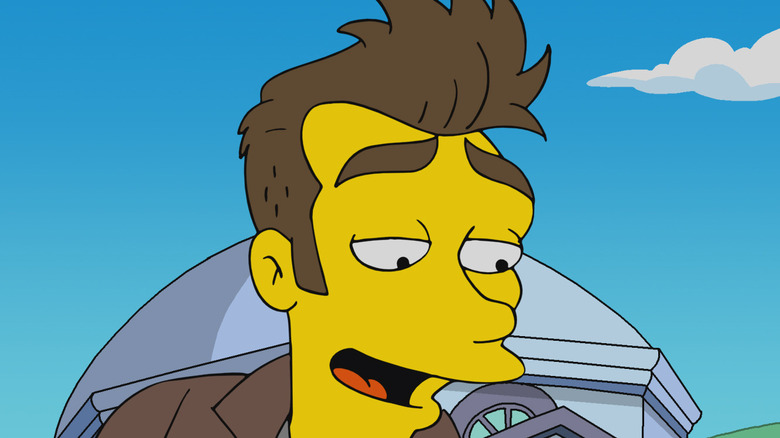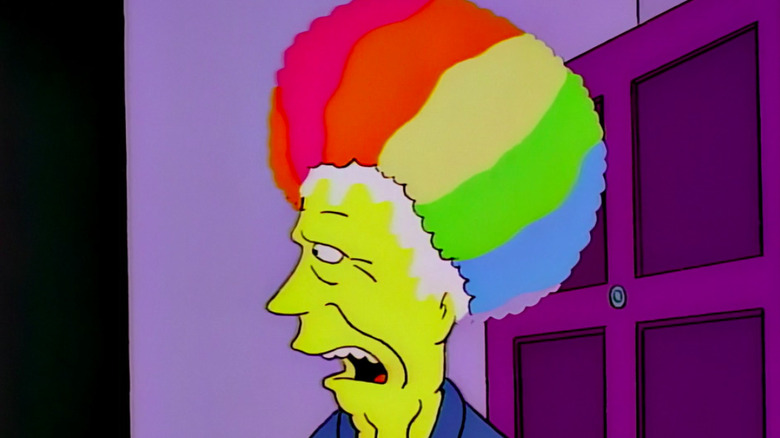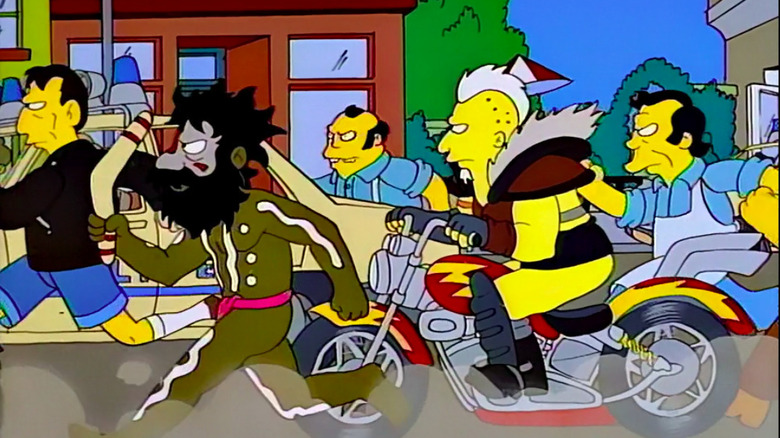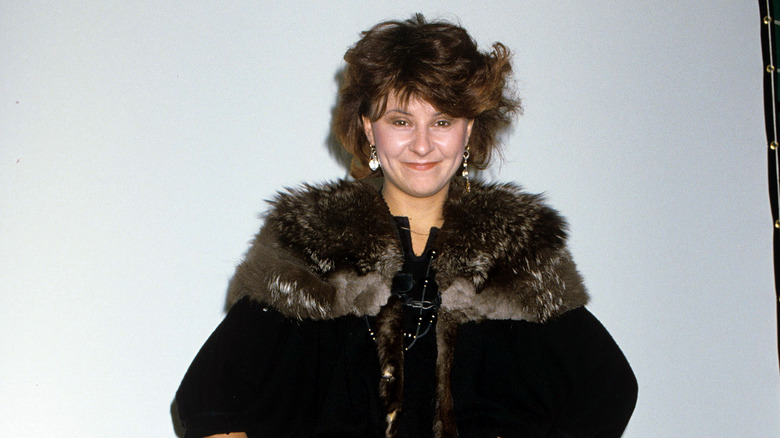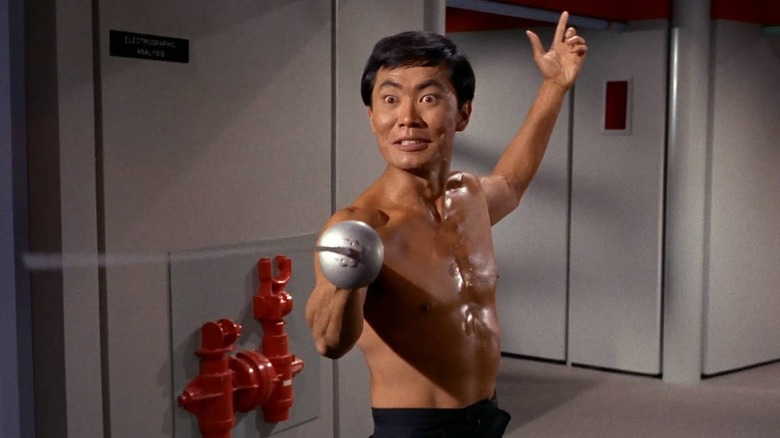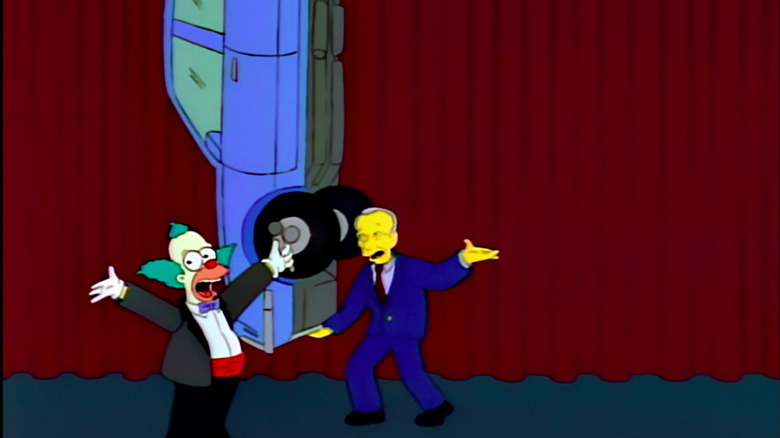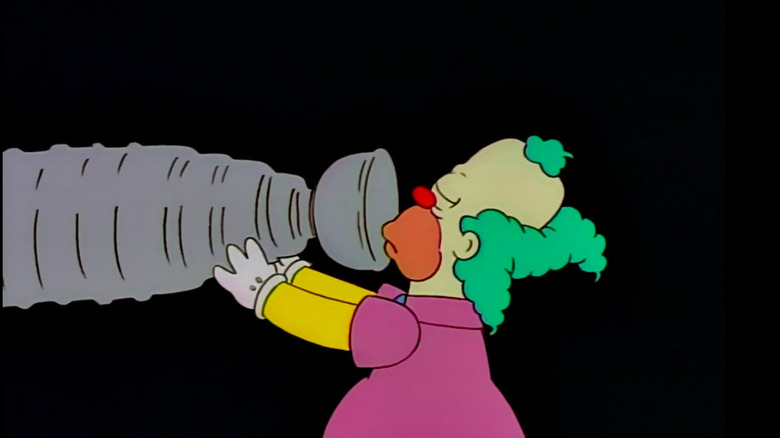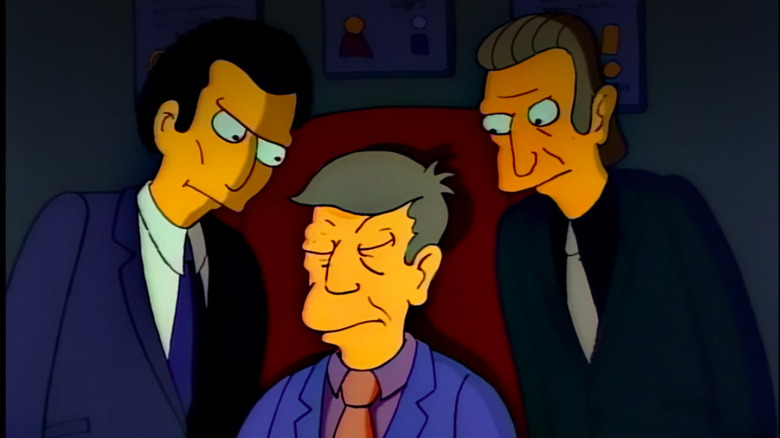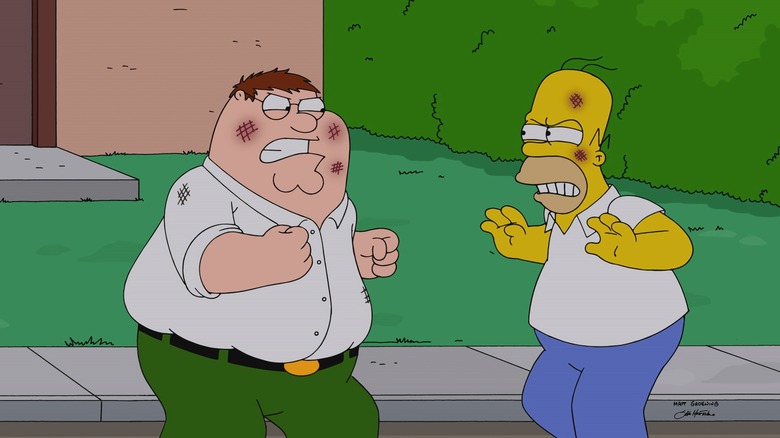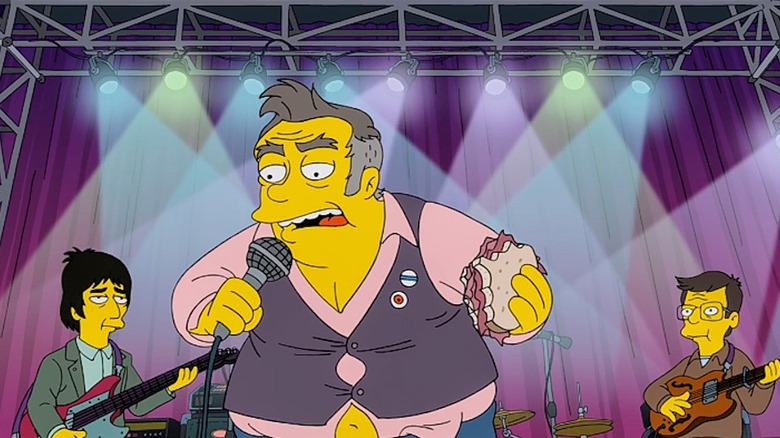Every Time A Celebrity Got Their Feelings Hurt By The Simpsons
You could count the primary cast of "The Simpsons" on your fingers — even if you only have four on each hand, like the titular family. But that nuclear family is backed with what might be the most expansive supporting cast this side of "Game of Thrones," filled with Doctor Nicks and Disco Stus and too many kids on Otto's bus to count.
"The Simpsons" has also regularly augmented that cast with a variety of celebrity guests, often lending their own voices but other times imitated by the regular players.
In many cases, the celebrities see their status as Springfield's newest resident as an honor. In others, they're less than enthused.
You don't poke the bear as often as Matt Groening and company have over 700 episodes without the bear biting back. As such, here's a brief history of celebrities who appeared on "The Simpsons" only to find themselves with a bigger bone to pick than Sideshow Mel.
George H.W. Bush attacked The Simpsons from the White House
The Simpsons' fraught-but-loving relationship when they came on the air in 1989 seems downright quaint and heartwarming now. But at the time, the nuclear family was a sacred institution, and the series' portrayal of a father who was a drunken slob and a backtalking hellraiser of a son was something close to blasphemy.
At least, that's certainly how then-president George H.W. Bush felt. In an interview with People in 1990, First Lady Barbara Bush called "The Simpsons" "the dumbest thing I had ever seen."
George H.W. Bush himself would back up his wife in 1992, famously remarking in a speech: "We need a nation closer to the Waltons than The Simpsons." Bush left himself wide open for a comeback there, since the Waltons may have respected the parental hierarchy, but they were also struggling through the worst of the Great Depression. Of course, that's exactly what "The Simpsons" pointed out in a promo where the family watched the live action clip of Bush's speech on TV, with Bart firing back: "Hey, we're just like the Waltons! We're praying for an end to the depression too!"
But the back-and-forth didn't end there. In 1996, the series aired "Two Bad Neighbors" as the thirteenth episode in Season 7. The now-classic episode had George and Barbara moving in across the street, turning the Bushes into a parody of the Wilsons from the "Dennis the Menace" comic strip. When George enforced his old-fashioned ideas of discipline by spanking Bart, he instigated a prank war that ended with a cathartic scene of Homer punching him square in the face.
Writer Bill Oakley has said that the episode is often misunderstood: "It's not a political attack, it's a personal attack," he said on the show's Season 7 DVD commentary. The episode was intended to parody Bush's "crotchetiness" rather than his politics, and co-showrunner Josh Weinstein compared the characterization to Frank Grimes — another buttoned-up Springfield outsider who clashed with Homer. If Bush ever came across the episode on TV, he never commented on it — but it seems quite reasonable that he'd have just changed the channel to "The Waltons."
Governments around the world protested The Simpsons
"The Simpsons" may have ticked off the President of the United States of America, but that's far from the only government they found themselves at odds with. In "Bart vs. Australia" (Season 6, Episode 16), the Simpsons boy stood trial before the Australian parliament for running up a local man's phone bill with an epic long-distance call.
The writers gleefully took the opportunity to skewer every national stereotype imaginable along with making up some totally new ones. Some Aussies loved it, others hated it and showrunner Mike Reiss told The Age that life imitated art when "We were condemned in the Australian Parliament."
Elsewhere in the world, Brazilian president Fernando Henrique Cardoso denounced "The Simpsons" and the Rio de Janeiro tourism board threatened to sue them for "Blame it on Lisa" (Season 13, Episode 15), which portrayed the South American city as a monkey-infested hotbed of crime where even little kids mug people. Locals weren't any happier that "The Simpsons" didn't even get the stereotypes correct — everyone in the show's version of the Portuguese-speaking country has a Spanish accent.
Tracey Ullman sued for a piece of the Simpsons pie
"The Simpsons" began as commercial bumpers for "The Tracey Ullman Show" before getting their own Christmas special and then series. But not everyone was thrilled as "Simpsons" soared, including Ullman.
The British comedian, recently nominated for an Emmy for "Mrs. America," told Entertainment Weekly in 1992 that "I breast-fed those little devils," filing a suit alongside producing partner Kenneth Estin against Fox. The duo claimed their contract entitled a 5% to 10% cut of the earnings of characters created for the show. But according to Variety, "Simpsons" producer James L. Brooks proved that Groening had created the Simpsons with no input from Ullman, and the jury decided in favor of the Simpsons' bosses at Fox.
Ironically, Groening had created the Simpsons to avoid this exact situation. He told NPR in 2003 that when the "Ullman" show hired called him in for an interview off the strength of his "Life in Hell" cartoons, he threw together some quick sketches based on his own family in the waiting room, so he could pitch those new characters and save his comic creations for himself.
George Takei refused a Simpsons script
The "Simpsons" crew is full of "Star Trek" fans, and they've taken every opportunity to get their idols on the show. George Takei, who played USS Enterprise helmsman Sulu, was one of their first celebrity guests, appearing as a sushi chef in Season 2's "One Fish, Two Fish, Blowfish, Blue Fish." He would have been in another iconic episode, except the subject matter upset him.
In Vice's oral history of "Marge vs. The Monorail," Reiss reveals that the crew had such a good time working with Takei that they wanted to bring him back. Unfortunately, Takei was a member of the committee for a mass transit project in LA, and he didn't want to be involved with a show (where a conman tricks Springfield into buying his monorail made with dangerously cheap materials so he can run off with profits) that could undermine public trust in the project.
Fortunately, his former "Trek" costar Leonard Nimoy didn't have any such qualms, leading to one of the funniest guest appearances in the show's history. Nimoy fit easily into the "Trek" jokes already written for Takei, such as when Mayor Quimby got mixed up and said "May the Force be with you." Nimoy also had some things written in, of course, including a joke intended to skewer his documentary voiceovers as he waxed poetic about a solar eclipse — thank goodness, because it just wouldn't have been the same to hear George Takei say "The cosmic ballet goes on."
Johnny Carson demanded a rewrite
The Season 4 finale "Krusty Gets Kancelled" was a regular bonanza of celebrity guests. Elizabeth Taylor, Bette Midler, the Red Hot Chili Peppers, and a boatload of others got together to put on a charity telethon for Springfield's favorite clown. The show also starred Johnny Carson, once one of the biggest names on television thanks to this thirty-year run on "The Tonight Show," which had ended just one year prior to his appearance on "The Simpsons."
As it turns out, he almost never appeared at all. CBR reports that Carson was insulted by the draft of the script he received, in which his retirement forced him to mooch off the Simpsons. The writers weren't willing to chalk it up as a loss, however. They'd all grown up on Carson's comedy, and writers Al Jean and Mike Reiss had begun their careers writing for him. Further making things difficult, Carson had shunned the spotlight after leaving "Tonight."
But kowtowing to a guest's demands wasn't in the "Simpsons" spirit and what's worse, it isn't funny. So, the writers instead re-wrote the script attempting to flatter Carson so much that it would become the joke itself. The new script portrayed Carson as a kind of super-showman, one who could sing opera while juggling a car and play the "Simpsons" theme song on accordion while tap-dancing and balancing two old men on his head. Carson warmed to the idea, recorded his lines the night after winning the first Emmy award for his final season of "The Tonight Show," and the beloved episode is still remembered fondly by fans as weird, wild stuff.
The NHL didn't like what The Simpsons did to their trophy
In "The Last Temptation of Krust" (Season 9, Episode 15), Krusty the Clown was reeling from a disastrous appearance at a show headlined by an ensemble of younger, hipper comedians. Forces to confront his own failings, he went on "the bender to end all benders," rendered as a montage with him shot-gunning an entire six-pack at once, then drinking from a slipper, a boot, and finally the Stanley Cup — which he promptly vomited into.
A funny bit for sure, but the National Hockey League wasn't laughing.
The Toronto Sun reported in 2014 that the NHL had sent "The Simpsons" creators a strongly-worded letter after the episode premiered in 1998. But then-showrunner Mike Scully says he ignored the letter on the advice of a "cool Fox lawyer." That's probably why Scully and his coworkers felt empowered to continue desecrating Lord Stanley's Cup in future episodes.
Sure enough, sharp-eyed viewers could spot the cup in the hotel-room flotsam and jetsam after Homer and Flanders' night of drunken Vegas debauchery in "Viva Ned Flanders" (Season 10, Episode 10), and it was later transformed into Maggie in the opening couch gag for Season 24, Episode 9's "Homer Goes to Prep School."
Frank Sivero sued The Simpsons for plagiarizing his likeness
Frank Sivero isn't so much a "celebrity" as a recognizable face to fans of gangster movies, which may explain why he's so litigious about protecting his image.
The veteran actor has snagged roles in seemingly all the classics of the genre during his decades-long career, and he's one of the few actors to appear in both pillars of gangster goodness, "Goodfellas" and "The Godfather."
Of course, the mafia is one subject "The Simpsons" has always enjoyed skewering via Fat Tony, a parody of the classic mob boss played by recurring guest Joe Mantegna. Since every gangster needs a gang, Fat Tony has been accompanied by various henchmen over the years, including one known as Louis "Louie" Walters.
In October 2014, Sivero brought a $250 million lawsuit against Fox Television Studios, claiming that Louie was based on his "Goodfellas" character Frankie Carbone and that it caused, in his own colorful words, "a loss of likeness." Sivero further claimed that Carbone was his own creation, without input from Nicholas Pileggi's "Goodfellas" script, and that he had been living next door to writers from "The Simpsons" who based the character on him.
Ultimately, the court found the character didn't sufficiently resemble Sivero, was a parody of multiple Mob characters, and would fall under First Amendment protections for parody even if it did. Sivero appealed and, four years later, got the same result.
The Simpsons had a running feud with Seth MacFarlane
When "The Simpsons" premiered in 1989, it made news as the first primetime animated show since "The Flintstones" in 1960-1966. But success breeds imitation, so after the show put Springfield on the map, audiences were flooded with an onslaught of adult-targeted evening cartoons ranging from "The Critic" to "Capitol Critters," Fish Police" to "Futurama," and "Family Dog" to "Family Guy."
Following the "Simpsons" formula pretty closely on the surface, many saw "Family Guy" as something of a knockoff when it arrived in 1999 boasting a fat dad, long-suffering wife and frequently embarrassed kids. Eventually, Seth MacFarlane's creation would establish its own fanbase thanks to an irreverent, surreal humor all too happy to go darker places than "The Simpsons" would.
But some makers of "The Simpsons" apparently weren't fans of their sometimes Sunday-evening companions, starting a long-running feud. It seemed to begin around "Missionary: Impossible" (Season 11, Episode 15), when Betty White was depicted as hosting a telethon and begging viewers to "help keep this crude, low-brow programming on the air" as she stood next to a "Family Guy" logo. It would continue across nine "Simpsons" episodes, from minor references (Mr Burns utters Stewie Griffin's catchphrase "What the deuce?" in Season 23, Episode 4's "Replaceable You") to major putdowns (in "Treehouse of Horror XIII," Homer creates an army of clones, with viewers seeing that one is Peter Griffin).
For their part, "Family Guy" shot back — including one vicious gag MacFarlane devised for Season 6, Episode 2's "Movin' Out (Brian's Song)" that had Quagmire macking on Marge Simpson and then murdering the entire family. This 2007 incident may have put an end to the feud — at least, publicly — after Fox cut the gag and reportedly told both sides to stop making fun of one another. The gag has been intact on subsequent "Family Guy" DVDs and airings on Adult Swim.
The "Simpsons" crew was divided over how seriously to take the feud: Jean said to Underground Online that "Family Guy" "should be more original," claiming he recognized specific gags they had stolen. "South Park" creator Trey Parker said that the "Simpsons" crew sent him flowers for mocking "Family Guy" even more viciously than they ever had in the episode "Cartoon Wars," but Groening told the AV Club, "The rivalry is very affectionate."
As for MacFarlane, he told in Rolling Stone in 2012 that he felt ostracized in his early career, so it's easy to see why he kept up his side of the battle.
Morrissey isn't happy with his Simpsonized caricature
"The Simpsons" might not be the pop culture phenomenon it has been at other times in its run, but it still makes the news quite often. Most recently, in the Season 32 episode "Panic on the Streets of Springfield," Lisa developed a new obsession with '80s British band The Snuffs and their vegetarian frontman Quilloughby (voiced by Benedict Cumberbatch and backed by new songs from Flight of the Conchords' Bret McKenzie).
If all this sounds vaguely familiar, it's because the character is a thinly-veiled caricature of Morrissey, beloved '80s lead singer of The Smiths and vegetarian activist.
In the decades since, however, Morrissey has developed a reputation for being irascible, and has fallen out of favor in some circles for his political views and controversial statements.
In the controversial episode, Lisa is horrified to meet her idol and discover he's become a racist slob who isn't even a vegetarian. For obvious reasons, Morrissey himself did not provide the voice.
The resemblance certainly wasn't lost on Morrissey himself, whose publicist posted a long, oddly punctuated rant after the episode about "this Simpson's bull—-," a typo that makes one wonder which specific Simpson he blames for all this. The publicist was especially offended by his client's portrayal as "racist, without pointing out any specific instances," possibly because there were too many to fit in a single episode.
Morrissey himself later responded with an even longer, rantier rant. Painting himself as a victim of harassment by the media, he claimed the only reason he hadn't launched a lawsuit in retaliation was because he lacked the funding and "business squad of legal practitioners ready to pounce."
Perhaps Moz should calm down, relax and ask himself what difference does it make. Because when it comes to getting his feelings hurt by "The Simpsons," it turns out he's in good company.
